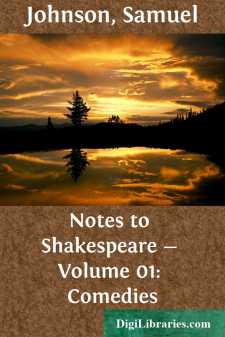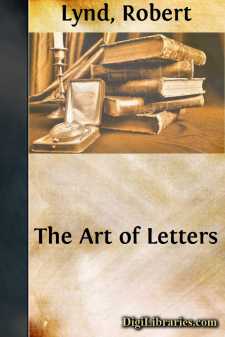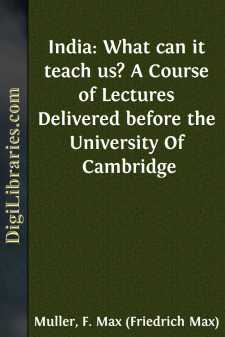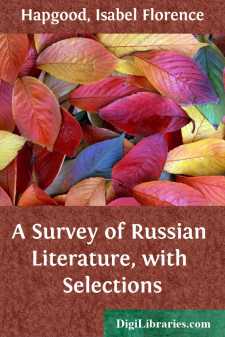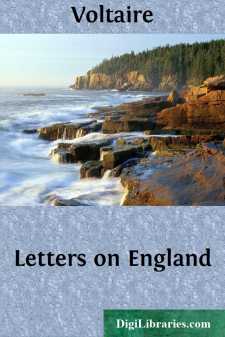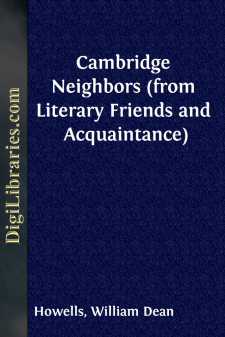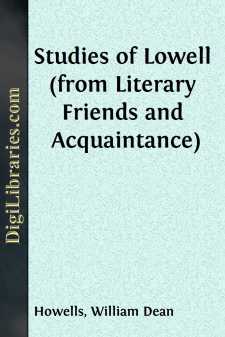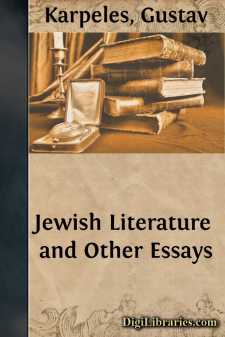Literary Criticism
- American 18
- Ancient and Classical 3
- Asian 1
- Australian & Oceanian 1
- Books & Reading 8
- Caribbean & Latin American 2
- Drama 2
- English, Irish, Scottish, Welsh 49
- European 7
- General 37
- Horror 1
- Humor 2
- Jewish 2
- Medieval 2
- Middle Eastern 3
- Poetry 7
- Renaissance 6
- Russian & Former Soviet Union 1
- Shakespeare 27
Literary Criticism Books
Sort by:
I think that every man ought to work for his living, without exception, and that when he has once avouched his willingness to work, society should provide him with work and warrant him a living. I do not think any man ought to live by an art. A man's art should be his privilege, when he has proven his fitness to exercise it, and has otherwise earned his daily bread; and its results should be free...
more...
by:
Samuel Johnson
Dr. Johnson's Preface to Shakespeare is one of the most famous critical essays of the eighteenth century, and yet too many students have forgotten that it is, precisely, a preface to the plays of Shakespeare, edited by Dr. Johnson himself. That is to say, the edition itself has been obscured or overshadowed by its preface, and the sustained effort of that essay has virtually monopolized scholarly...
more...
by:
Robert Lynd
I.—Mr. Pepys Mr. Pepys was a Puritan. Froude once painted a portrait of Bunyan as an old Cavalier. He almost persuaded one that it was true till the later discovery of Bunyan’s name on the muster-roll of one of Cromwell’s regiments showed that he had been a Puritan from the beginning. If one calls Mr. Pepys a Puritan, however, one does not do so for the love of paradox or at a guess. He tells...
more...
My dear Cowell: As these Lectures would never have been written or delivered but for your hearty encouragement, I hope you will now allow me to dedicate them to you, not only as a token of my sincere admiration of your great achievements as an Oriental scholar, but also as a memorial of our friendship, now more than thirty years old, a friendship which has grown from year to year, has weathered many a...
more...
THE ANCIENT PERIOD, FROM THE EARLIEST TIMES TO THE INTRODUCTION OF CHRISTIANITY IN 988. Whether Russia had any literature, or even a distinctive alphabet, previous to the end of the tenth century, is not known. In the year 988, VladÃmir, Grand Prince of KÃeff, accepted Christianity for himself and his nation, from Byzantium, and baptized Russia wholesale. Hence his characteristic title in...
more...
by:
F. F. Arbuthnot
PREFACE. The following pages contain nothing new and nothing original, but they do contain a good deal of information gathered from various sources, and brought together under one cover. The book itself may be useful, not, perhaps, to the Professor or to the Orientalist, but to the general reader, and to the student commencing the study of Arabic. To the latter it will give some idea of the vast field...
more...
by:
Voltaire
INTRODUCTION François Marie Arouet, who called himself Voltaire, was the son of François Arouet of Poitou, who lived in Paris, had given up his office of notary two years before the birth of this his third son, and obtained some years afterwards a treasurer’s office in the Chambre des Comptes. Voltaire was born in the year 1694. He lived until within ten or eleven years of the outbreak of the...
more...
Being the wholly literary spirit I was when I went to make my home in Cambridge, I do not see how I could well have been more content if I had found myself in the Elysian Fields with an agreeable eternity before me. At twenty-nine, indeed, one is practically immortal, and at that age, time had for me the effect of an eternity in which I had nothing to do but to read books and dream of writing them, in...
more...
I have already spoken of my earliest meetings with Lowell at Cambridge when I came to New England on a literary pilgrimage from the West in 1860. I saw him more and more after I went to live in Cambridge in 1866; and I now wish to record what I knew of him during the years that passed between this date and that of his death. If the portrait I shall try to paint does not seem a faithful likeness to...
more...
by:
Gustav Karpeles
A GLANCE AT JEWISH LITERATURE In a well-known passage of the Romanzero, rebuking Jewish women for their ignorance of the magnificent golden age of their nation's poetry, Heine used unmeasured terms of condemnation. He was too severe, for the sources from which he drew his own information were of a purely scientific character, necessarily unintelligible to the ordinary reader. The first truly...
more...



